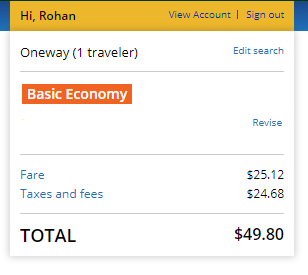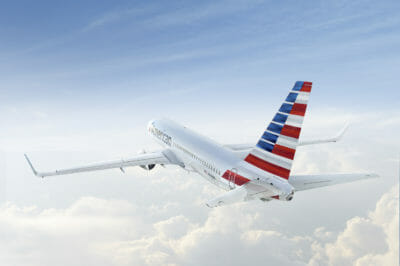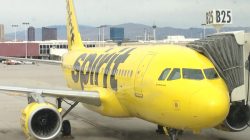Basic Economy was introduced by United Airlines and American Airlines earlier this year. I’ve now had the chance to sample the Basic Economy product on both American and United several times, and I am pleased to say that I stand by my earlier beliefs in the viability of the product.
Then again, I’ve also embraced Spirit Airlines’ model for some time (as long as the operational performance of the carrier is in good shape) and so this shouldn’t come as a huge surprise to many. That being said, there are some things I’ve learned along the way in terms of the actual customer experience vs. what is advertised online, so here are my two comparisons:
Below, I will outline my in-person experiences with the product.
Basic Economy Overview
- Seat assignments will take place at check-in (though this can be circumvented, as I will explain below)
- Carry-on bags are limited to a small personal item (laptop, purse, backpack, handbag) unless you are an elite status holder at American, United or one of their Member Alliances, or you are a qualifying Branded-Credit card holder.
- Last Group boarding (unless an elite status holder or credit card holder)
- No voluntary ticket changes (24 hour flexible booking policy excluded)
- No Premier-Qualifying Miles, Segments or Dollars earned, nor lifetime miles or contribution to the four-segment minimum (customers will still earn redeemable miles) on United, and reduced earning on American (by 50%)
- No EconomyPlus nor Premium Cabin upgrades (exceptions apply on American)
- No combinability with regular economy fares or partner carriers, nor interline travel.
Booking
Booking a basic economy ticket (or avoiding it) is relatively straightforward. United Airlines and American Airlines are both very transparent about the restrictions that the BE product will entail in the shopping and pricing flow. Additionally, they will send you an email after checking in, as well as prior to departure, to remind customers that there are restrictions in terms of amenities.
Basic Economy Booking Flow

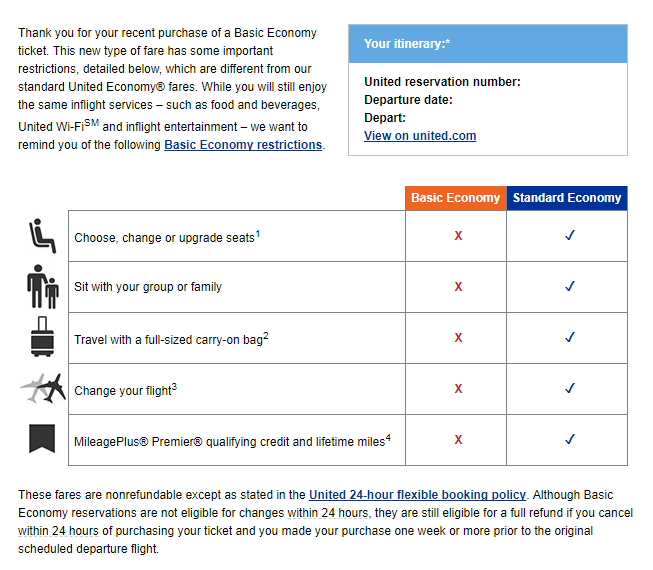
Furthermore, the email comes WITHIN 24 hours of booking, meaning that customers are informed about the restrictions in case they want to take advantage of the free cancellation window (unless the fare has been purchased within 7 days of the flight). It is always important for travelers to know about the 24-hour cancellation policy and to be well-versed in the rules because there are definitely some restrictions on these benefits if it is close to the actual day of departure. There have been reports, however, of people who have booked a B/E fare within 7 days of travel, and have canceled within the 24-hour window and successfully received a refund, but I would be wary of this as it does not sound like a guarantee.
Pricing-wise, I will say that my fares on American were very inexpensive, but I also booked further out in the curve. I purchased two one-way flights (DFW-MSP and LAX-DFW) all for less than $50. My flight on United in BE was from SFO to DFW and was $139, but I also booked this one out ~10 days in advance.
Unfortunately some bank rewards programs are not as transparent, but Amol has written a helpful post that to explain how basic economy works with some typical travel portals like Chase Ultimate Rewards.
Seat Selection
Basic economy passengers do not get advanced seat selection privileges, but there is a workaround: if you are flying American Airlines, and you are an Alaska Airlines MVP, MVP Gold or MVP Gold 75K, then you can take advantage of the seat selection privileges that American normally grants to Alaska elites. As a MVP Gold, I was able to do this by putting in my Mileage Plan number and then the system waived the seat selection fees for Main Cabin Extra for me, which as an awesome perk. You must remember to log-out of your AAdvantage account on American’s website in order to do this, however. You also have to note that the miles will be accrued to Alaska’s Mileage program, and not AAdvantage. Crediting a Basic Economy flight on American to Alaska’s MVP Program is also far more lucrative in terms of actual redeemable miles.
On United, I obviously had to seat wherever I was assigned, but luckily there were two empty seats in the back row, and the flight attendant graciously allowed me to move. It was also on an E-175, so either way, I would have been placed in a window or an aisle.
On my LAX-DFW flight, I was not able to get a seat assignment in MCE as they were all booked up, so I was relegated to a middle seat. It was also a red-eye but on an Airbus A321. But I slept just fine. I took a melatonin and managed to get about 2.5 hours of sleep prior to landing in DFW.
Check-In
This is the one area where there are differences in the customer experience. American permits online check-in (OLCI) for BE passengers via all traditional methods, like mobile, print at home, etc and there’s no need to go through an extra check-point at the airport. United, conversely, requires one to go to an airport check-in counter and get my boarding pass printed out. The reason for this is so that the agent could check to ensure that I was not carrying on a bag larger than the allowance for BE (can only fit under the seat in front of you).
I found this step slightly annoying because when I was checking in at SFO, there were a lot of 3rd-party agents that were helping out in the kiosk area, but only one actual United employee, and there were several of us who needed her to “validate” that we were booked in BE and following the rules. This led to some additional wait time.
That said, I also wonder if United MileagePlus Credit Cardholders are also allowed to check-in online and not have to go through this step as AA customers who have the MasterCard or Citi card can still carry-on a bag and place it in the overhead bin.
American, in a recent instance, didn’t assign me a seat when I checked in, but instead gave me a slip to go get my seat assignment at the gate. This was due to the fact that I had forgotten to book the ticket under my Alaska MVP account, however.
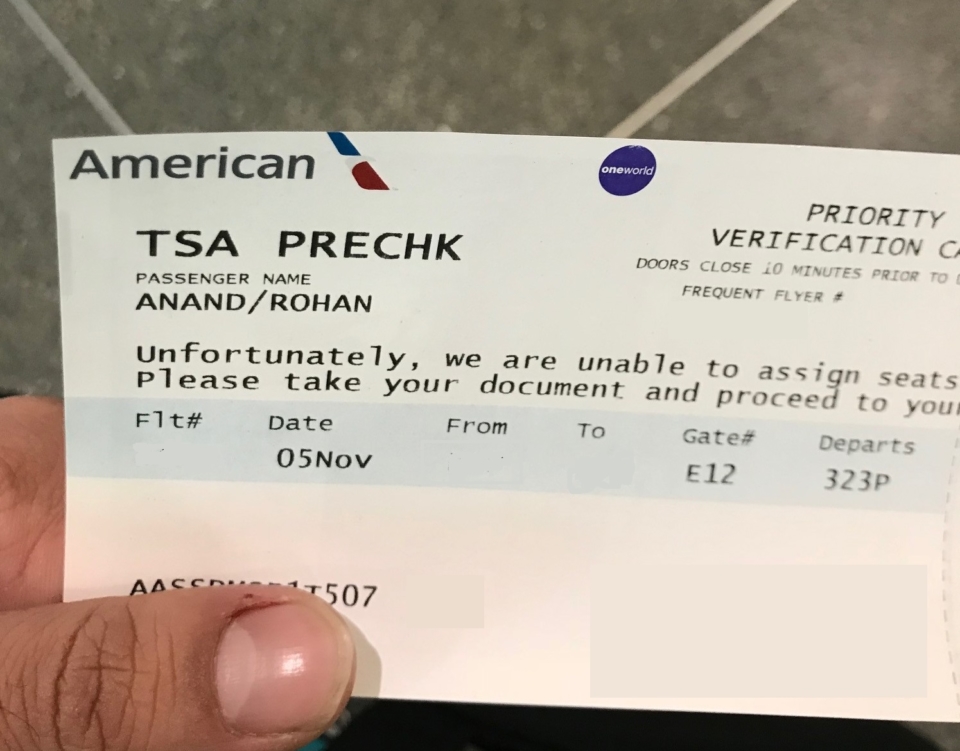
Carry-On Luggage Enforcement
As an AAdvantage Credit Cardholder, I am exempt from the carry-on limitation of overhead storage. On United, however, I did not see this policy enforced. I put my backpack underneath the seat next to me, as it was open, and the flight attendants did not enforce the fact that I needed to keep it under the seat directly in front of me (to me, that is just being pedantic for a ~4-hour flight from SFO to DFW, gate to gate.
I haven’t heard of any experiences where gate agents or flight attendants require customers to store their under-seat luggage underneath the seat in front of them IF they are booked in BE and are not entitled to any of the exemptions. Even on Spirit, I’ve noticed that flight attendants will rarely enforce customers to keep their bookbags under the seat in front of them because there usually is plenty of overhead bin space. The seats are very tight as-is, and it is just a more customer-friendly approach. Furthermore, most Spirit customers who store larger bags in the overhead bins have already paid for them online or at the gate, so its not like there is huge revenue leakage from allowing backpacks to go in the space above.
Customer Experience
This is still very much unchanged. I have had nothing but very positive experiences flying American and United recently. I’ve noticed some very friendly employees and they always provide top-notch service. Each airline has new seats and in-flight wifi and entertainment that are always functional and on-point. They give out pretzels and unlimited non-alcoholic drinks. WiFi is cheap and fast and the seats are cozy. Each flight has left on-time and operational issues at the gate have been minimal to none.
Basic economy Bottom Line
The pax ex for basic economy, in my opinion, is a very functional product. I know that I also have certain privileges as an elite flier, but I feel like the sample size has given me a breadth of experiences to be able to speak to it affirmatively. I know that there is not a chance that I will earn enough miles to retain elite status with either carrier (having seen that ship sail a long time ago) so I’m happy to take advantage of their discounted fares if it allows me extra flexibility and some cost-savings.
I stand by what I wrote a year ago in that Basic Economy has a good value proposition. I will argue, however, that I am purely speaking from a Pax Ex perspective, and not from a commercial perspective as to whether it makes sense for the airlines to go after bottom-feeder carriers with deeply discounted fares. That is data I do not have access to, nor do I think the practice has been around for long enough to determine whether it makes commercial sense in all markets.
But as a passenger, overall, it still is very straightforward to me.

